
Hippolyte Carnot
This article relies largely or entirely on a single source. (February 2012) |

Lazare Hippolyte Carnot (6 October 1801, Saint-Omer – 16 March 1888) was a French politician. He was the younger brother of the founder of thermodynamics Sadi Carnot and the second son of the revolutionary politician and general Lazare Nicolas Marguerite Carnot, who also served in the government of Napoleon, as well as the father of French president Marie François Sadi Carnot.

Early life
Hippolyte Carnot was born in Saint-Omer, Pas-de-Calais. After the final defeat of Napoleon in 1815, his father went into exile. Hippolyte Carnot lived at first in exile with his father, returning to France only in 1823. Unable to enter active political life, he turned to literature and philosophy, publishing in 1828 a collection of Chants helléniens translated from the German of Wilhelm Müller, and in 1830 an Exposé de la doctrine Saint-Simonienne, and collaborating in the Saint-Simonian journal Le Producteur. He paid several visits to Britain and travelled in other countries of Europe.[1]

Overview
In March 1839 after the dissolution of the chamber by Louis Philippe, he was elected deputy for Paris (re-elected in 1842 and in 1846), and sat in the group of the Radical Left, being one of the leaders of the party hostile to Louis Philippe. On 24 February 1848 he pronounced in favour of the republic. Alphonse de Lamartine chose him as minister of education in the provisional government, and Carnot set to work to organize the primary school systems, proposing a law for obligatory and free primary instruction, and another for the secondary education of girls. He opposed purely secular schools, holding that "the minister and the schoolmaster are the two columns on which rests the edifice of the republic." By this attitude he alienated both the Right and the Republicans of the Extreme Left, and was forced to resign on 5 July 1848. He was one of those who protested against the coup d'état of 2 December 1851 but was not proscribed by Louis Napoleon. He refused to sit in the Corps Législatif until 1864, in order not to have to take the oath to the emperor.[1]

From 1864 to 1869 he was in the republican opposition, taking a very active part. He was defeated at the election of 1869. On 8 February 1871 he was elected deputy for the Seine-et-Oise département. He joined the Gauche républicaine parliamentary group and participated in the drawing up of the Constitutional Laws of 1875. On 16 December 1875 he was named by the National Assembly senator for life. He died three months after the election of his elder son, Marie François Sadi Carnot, to the presidency of the republic.[1]

He had published Le Ministère de l'Instruction Publique et des Cultes, depuis le 24 février jusqu'au 5 juillet 1848, Mémoires sur Carnot par son fils (2 vols., 1861–1864), Mémoires de Barère de Vieuzac (with David d'Angers, 4 vols 1842–1843). His second son, Marie Adolphe Carnot (b. 1830), became a distinguished mining engineer and director of the École des Mines (1899), his studies in analytical chemistry placing him in the front rank of French scientists. He was made a member of the Academy of Sciences in 1895.[1]

References
- ^ a b c d Chisholm 1911.
Attribution:

- This article incorporates text from a publication now in the public domain: Chisholm, Hugh, ed. (1911). "Carnot, Lazare Hippolyte". . Vol. 5 (11th ed.). Cambridge University Press. p. 376.
Sources
- Vermorel, Les Hommes de 1848 (3rd ed., 1869);
- Spuller, Histoire parlementaire de la Seconde Republique (1891);
- Pierre de La Gorce, Histoire du Second Empire (1894 et seq.).
- 1801 births
- 1888 deaths
- People from Saint-Omer
- Carnot family
- Moderate Republicans (France)
- Opportunist Republicans
- Ministers of public education and religious affairs of France
- Members of the 5th Chamber of Deputies of the July Monarchy
- Members of the 6th Chamber of Deputies of the July Monarchy
- Members of the 7th Chamber of Deputies of the July Monarchy
- Members of the 1848 Constituent Assembly
- Members of the National Legislative Assembly of the French Second Republic
- Members of the 1st Corps législatif of the Second French Empire
- Members of the 2nd Corps législatif of the Second French Empire
- Members of the 3rd Corps législatif of the Second French Empire
- Members of the National Assembly (1871)
- Members of Parliament for Seine
- Members of Parliament for Seine-et-Oise
- French life senators
- Parents of presidents of France
- Burials at Père Lachaise Cemetery
- Children of presidents of France
See what we do next...
OR
By submitting your email or phone number, you're giving mschf permission to send you email and/or recurring marketing texts. Data rates may apply. Text stop to cancel, help for help.
Success: You're subscribed now !




